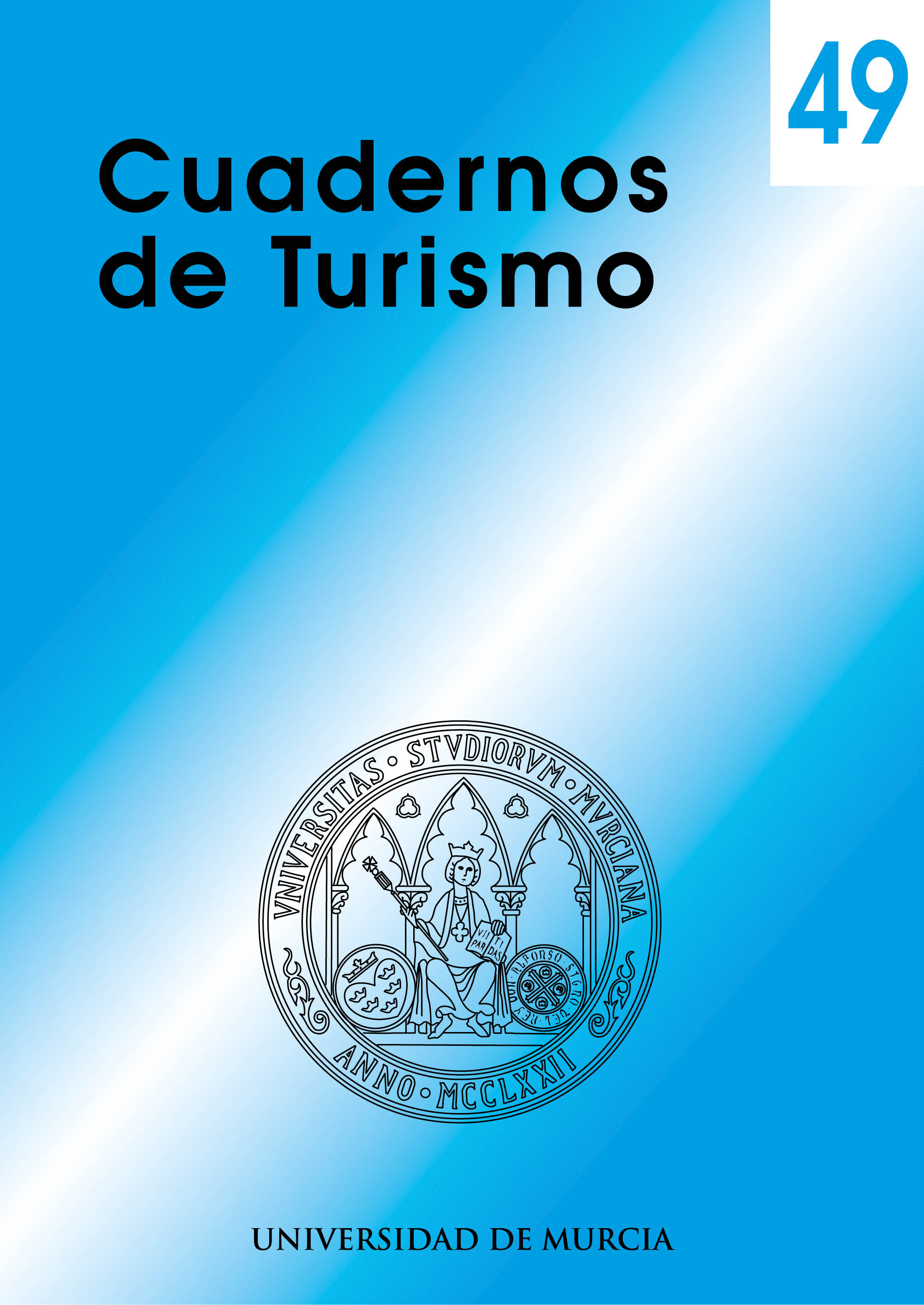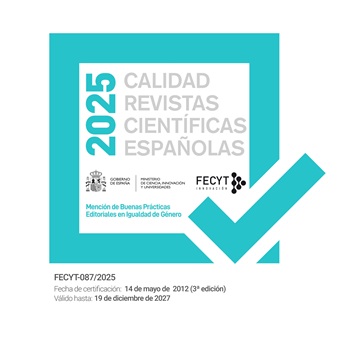SOSTENIBILIDAD Y DESEMPEÑO EN LA INDUSTRIA HOTELERA: EL PAPEL MEDIADOR DE LAS VENTAJAS COMPETITIVAS
Resumen
La relación entre sostenibilidad y desempeño ha sido analizada en estudios previos sin llegar a un consenso en la industria hotelera. Este estudio examina la relación entre sostenibilidad y desempeño, y el efecto mediador de las ventajas competitivas en costes y diferenciación en dicha relación. Los resultados muestran que la sostenibilidad influye positivamente sobre el desempeño perceptual y sobre los ingresos por habitación disponible; la sostenibilidad tiene una relación directa con las ventajas en costes y diferenciación; y la ventaja en diferenciación media la relación entre sostenibilidad y desempeño.
Descargas
-
Resumen2132
-
PDF (ESPAÑOL)2411
-
PDF (INGLÉS) 2411
Citas
ALI, H.Y., DNISH, R.Q. y ASRAR-UL-HAQ, M. (2019): “How corporate social responsibility boosts firm financial performance: the mediating role of corporate image and customer satisfaction”, Corporate Social Responsibility and Environmental Management, vol. 27 (1), pp. 1-12.
ALIMARKET (2018): Hoteles. Base de Datos. https://www.alimarket.es/hoteles
ARMSTRONG, J. y OVERTON, T. (1977): “Estimating nonresponse bias in mail surveys”. Journal of Marketing Research, vol. 14 (3), pp. 396-402.
BARNEY, J.B. (2001): “Resource-based theories of competitive advantage: A ten-year retrospective on the resource-based view”, Journal of Management, vol. 27 (6), pp. 643-650.
BEAL, R.M. (2000): “Competing effectively: Environmental scanning, competitive strategy, and organizational performance in small manufacturing firms”, Journal of Small Business Management, vol. 38 (1), pp. 27-47.
BOU-LLUSAR, J. C., ESCRIG-TENA, A.B., ROCA-PUIG, V. y BELTRÁN-MARTÍN, I. (2009): “An empirical assessment of the EFQM Excellence Model: Evaluation as a TQM framework relative to the MBNQA Model”, Journal of Operations Management, vol. 27 (1), pp. 1-22.
CALVERAS, A.(2015): “Corporate social responsibility strategy in the hotel industry: evidence from the Balearic Islands”, International Journal of Tourism Research, vol. 17 (4), pp. 399-408.
CARMONA-MORENO, E., CÉSPEDES-LORENTE, J. y DE BURGOS-JIMÉNEZ, J. (2004): “Environmental strategies in Spanish hotels: Contextual factors and performance”, Service Industries Journal, vol. 24 (3), pp. 101-130.
CEPEDA-CARRIÓN, G., NITZL C. y ROLDÁN, J.L. (2017): “Mediation analyses in partial least squares structural equation modelling: Guidelines and empirical examples”, en Latan, H.y R.Noonan (Eds.) Partial Least Squares Path Modelling. Cham, Springer International Publishing, pp. 173-195.
CLAVER-CORTÉS, E., MOLINA-AZORÍN, J.F., PEREIRA-MOLINER, J. y LÓPEZ-GAMERO, M.D. (2007): “Environmental Strategies and Their Impact on Hotel Performance”, Journal of Sustainable Tourism, vol. 15 (6), pp. 663-679.
CVELBAR, L.K. y DWYER,L. (2013): “An importance-performance analysis of sustainability factors of long-term strategy planning in Slovenian hotels”, Journal of Sustainable Tourism, vol. 21 (3), pp. 487-504.
DE GROSBOIS, D. (2012): “Corporate social responsibility reporting by the global hotel industry: Commitment, initiatives and performance”, nternational Journal of Hospitality Management, vol. 31 (3), pp. 896-905.
DÉNIZ, J.J., VERONA, M.C. y BARRERA, J.J. (2017): “La información sobre responsabilidad social corporativa en los hoteles de las Islas Canarias”, Cuadernos de Turismo, nº 40, pp. 225-249.
FARHA, A.K.A., AL-KWIFI, O.S. y AHMED, Z.U. (2018): “Deploying partial least squares to investigate the influence of managerial assumptions on corporate social responsibility in the hotel industry”, Journal of Hospitality and Tourism Technology, vol. 9 (3), pp. 471-486.
FORNELL, C. y LARCKER, D.F. (1981): “Evaluating structural equation models in unobservable variables and measurement error”, Journal of Marketing Research, vol. 18 (1), pp. 39-50.
FREEMAN, R.E. (1984): Strategic Management: A Stakeholder Approach. Boston, Pitman.
FRIEDMAN, M. (1970): “The social responsibility of business is to increase its profits”, New York Times Magazine, September 13. Recuperado de https://www.nytimes.com/1970/09/13/archives/a-friedman-doctrine-the-social-responsibility-of-business-is-to.html
GALBREATH, J. y SHUM, P. (2012): “Do customer satisfaction and reputation mediate the CSR-FP link? Evidence from Australia”, Australian Journal of Management, vol. 37 (2), pp. 211-229.
GARAY, L. y FONT, X. (2012): “Doing good to do well? Corporate social responsibility reasons, practices and impacts in small and medium accommodation enterprises”, International Journal of Hospitality Management, vol. 31 (2), pp. 329-337.
GARAY, L. y FONT, X. (2013): "Corporate social responsibility in tourism small and medium enterprises evidence from Europe and Latin America”, Tourism Management Perspectives, vol. 7, pp. 38-46.
GARCÍA-RODRÍGUEZ, F.J. y ARMAS-CRUZ, Y. (2007): “Relation between social-environmental responsibility and performance in hotel firms”, International Journal of Hospitality Management, vol. 26 (4), pp. 824-839.
GHADERI, Z., MIRZAPOUR, M., HENDERSON, J.C. y RICHARDSON,S. (2019): “Corporate social responsibility and hotel performance: a view from Tehran, Iran”, Tourism Management Perspectives, vol. 29, pp. 41-47.
GONZÁLEZ-RODRÍGUEZ, M.R., MARTÍN-SAMPER, R.C., KÖSEOGLU, M.A. y OKUMUS, F. (2019): “Hotels’ corporate social responsibility practices, organizational culture, firm reputation, and performance”, Journal of Sustainable Tourism, vol. 27 (3), pp.398-419.
GOVINDARAJAN, V. (1988): “A contingency approach to strategy implementation at the business- unit level: Integrating administrative mechanisms with strategy”, Academy of Management Journal, vol. 31 (4), pp. 828-153.
HAIR, J.F. Jr., HULT, G.T., RINGLE, C.M. y SARSTEDT, M. (2017): A Primer on Partial Least Squares Structural Equation Modeling (PLS-SEM). Second Edition, SAGE Publications.
HENSELER, J., HUBONA, G. y RAY, P.A. (2016): “Using PLS path modeling in new technology research: Updated guidelines”, Industrial Management & Data Systems, vol. 116 (1), pp. 2-20.
HENSELER, J., RINGLE, C.M. y SARSTEDT, M. (2015): “A new criterion for assessing discriminant validity in variance-based structural equation modelling”, Journal of the Academy of Marketing, vol. 43, pp. 115-135.
HENSELER, J. (2017): “Bridging design and behavioral research with variance-based structural equation modelling”, Journal of Advertising, vol. 46 (1), pp. 178-192.
INE (Instituto Nacional de Estadística) (2020): Cuenta Satélite del Turismo de España (CSTE). Revisión Estadística 2019 Serie 2016 – 2019. Recuperado de https://www.ine.es/prensa/cst_2019.pdf
INOUE, Y. y LEE, S. (2011): “Effects of different dimensions of corporate social responsibility on corporate financial performance in tourism-related industries”, Tourism Management, vol. 32 (4), pp.790-804.
KANG, K. H., LEE, S. y HUH, C. (2010): “Impacts of positive and negative corporate social responsibility activities on company performance in the hospitality industry”, International Journal of Hospitality Management, vol. 29 (1), pp. 72-82.
KONG, Y., ANTWI‐ADJEI, A. y BAWUAH, J. (2020): “A systematic review of the business case for corporate social responsibility and firm performance”, Corporate Social Responsibility and Environmental Management, vol. 27 (2), pp. 444-454.
LEE, M.P. (2008):“A review of the theories of corporate social responsibility: its evolutionary path and the road ahead”, International Journal of Management Reviews, vol. 10 (1), pp. 3-73.
LEE, J. y MILLER, D. (1996): “Strategy, environment and performance in two technological contexts: Contingency theory in Korea”, Organization Studies, vol. 17 (5), pp. 729-750.
LEE, S. y PARK, S-Y. (2009): “Do socially responsible activities help hotels and casinos achieve their financial goals?”, International Journal of Hospitality Management, vol. 28, pp. 105-112.
MALDONADO-ERAZO, C.P., ÁLVAREZ-GARCÍA, J.A., DEL RÍO-RAMA, M.C. y CORREA-QUEZADA, R. (2020): “Corporate Social Responsibility and Performance in SMEs: Scientific Coverage”, Sustainability, vol. 12 (6), pp. 2.332.
MILLER, D. (1988): “Relating Porter's business strategies to environment and structure: Analysis and performance implications”, Academy of Management Journal, vol. 31 (2), pp. 280-308.
NITZL, C., ROLDÁN, J.L. y CEPEDA, G. (2016): “Mediation analysis in partial least squares path modelling”, Industrial Management and Data Systems, vol. 116 (9), pp. 1.849-1.864.
ORLITZKY, M., SCHMIDT, F.L. y RYNES, S.L. (2003): “Corporate social and financial performance: a meta-analysis”, Organization Studies, vol. 24 (3), pp. 403-441.
OTHMAN, N.Z. y HEMDI, M.A. (2014): “Corporate Social Responsibility (CSR) activities, Brand image and hotel guest retention”, en Sumerjan, N. et al. (Eds.) Hospitality and Tourism: Synergizing Creativity and Innovation in Research. CRC Press, pp. 17-21.
PALACIOS-FLORENCIO, B., GARCÍA DEL JUNCO, J., CASTELLANOS-VERDUGO, M. y ROSA-DÍAZ, I.M. (2018): “Trust as mediator of corporate social responsibility, image and loyalty in the hotel sector”, Journal of Sustainable Tourism, vol. 26 (7), pp. 1.273-1.289.
PEREIRA MOLINER, J., MOLINA AZORÍN, J.F., TARÍ GUILLÓ, J.J., PERTUSA ORTEGA, E.M. y LÓPEZ GAMERO, M.D. (2019): “Sostenibilidad, calidad, innovación y ventaja competitiva en el sector hotelero: un estudio de caso”, Revista Internacional de Turismo, Empresa y Territorio, vol. 3 (1), pp. 1-21.
PODSAKOFF, P.M. y ORGAN, D.W. (1986): “Self-reports in organizational research: Problems and prospects”, Journal of Management, vol. 12 (4), pp. 531-544.
RAMANATHAN, R., RAMANATHAN, U. y ZHANG, Y. (2016): “Linking operations, marketing and environmental capabilities and diversification to hotel performance: A data envelopment analysis approach”, International Journal of Production Economics, vol. 176, pp. 111-122.
RIGDON, E.E. (2016): “Choosing PLS path modelling as analytical method in European management research: A realist perspective”, European Management Journal, vol. 34 (6), pp. 598-605.
RINGLE, C.M., WENDE, S. y BECKER, J.A. (2014). SmartPLS 3. Hamburg. http://www.smartpls.de
SAINAGHI, R., PHILLIPS, P. y ZAVARRONE, E. (2017): “Performance measurement in tourism firms: A content analytical meta-approach”, Tourism Management, vol. 59, pp. 36-56.
SILA, I. y CEK, K. (2017): “The impact of environmental, social and governance dimensions of corporate social responsibility on economic performance: Australian evidence”, Procedia Computer Science, vol. 120, pp. 797-804.
TANG, Y.H., AMRAN, A. y GOH, Y.N. (2014):“Environmental management practices of hotels in Malaysia: Stakeholder perspective”, International Journal of Tourism Research, vol. 16 (6), pp. 586-595.
TARÍ, J.J., CLAVER-CORTÉS, E., PEREIRA-MOLINER, J. y MOLINA-AZORÍN, J.F. (2010): ” Levels of quality and environmental management in the hotel industry: Their joint influence on firm performance”, International Journal of Hospitality Management, vol. 29 (3), pp. 500-510.
TARÍ, J.J., MOLINA, J.F. y CASTEJÓN, J.L. (2007): “The relationship between quality management practices and their effects on quality outcomes”, European Journal of Operational Research, vol. 183 (2), pp. 483-501.
TEECE, D. (2014): “The foundations of enterprise performance: dynamic and ordinary capabilities in an (economic) theory of firms”, Academy of Management Perspectives, vol. 28 (4), pp. 328-352.
THEODOULIDIS, B., DIAZ, D., CROTTO, F. y RANCATI, E. (2017): “Exploring corporate social responsibility and financial performance through stakeholder theory in the tourism industries”, Tourism Management, vol. 62, pp. 173-188.
UNWTO (United Nations World Tourism Organization) (2019): El turismo y los ODS. Recuperado de http://www2.unwto.org/es/content/el-turismo-y-los-ods
WEF (World Economic Forum) (2019): The Travel & Tourism Competitiveness Report 2019. Recuperado de https://www.weforum.org/reports/the-travel-tourism-competitiveness-report-2019
XIE, X., JIA, Y., MENG, X. y LI, C. (2017): “Corporate social responsibility, customer satisfaction, and financial performance: The moderating effect of the institutional environment in two transition economies”, Journal of Cleaner Production, vol. 150, pp. 26-39.
ZHU, Y., SUN, L-Y. y LEUNG, S.M. (2014): “Corporate social responsibility, firm reputation, and firm performance: the role of ethical leadership”, Asia Pacific Journal of Management, vol. 31, pp. 925-947.
ZOLLO, M. y WINTER, S. (2002): “Deliberate learning and the evolution of dynamic capabilities”, Organization Science, vol. 13 (3), pp. 339-351.
Las obras que se publican en esta revista están sujetas a los siguientes términos:
1. El Servicio de Publicaciones de la Universidad de Murcia (la editorial) conserva los derechos patrimoniales (copyright) de las obras publicadas, y favorece y permite la reutilización de las mismas bajo la licencia de uso indicada en el punto 2.
2. Las obras se publican en la edición electrónica de la revista bajo una licencia Creative Commons Reconocimiento-NoComercial-SinObraDerivada 3.0 España (texto legal). Se pueden copiar, usar, difundir, transmitir y exponer públicamente, siempre que: i) se cite la autoría y la fuente original de su publicación (revista, editorial y URL de la obra); ii) no se usen para fines comerciales; iii) se mencione la existencia y especificaciones de esta licencia de uso.
3. Condiciones de auto-archivo. Se permite y se anima a los autores a difundir electrónicamente las versiones pre-print (versión antes de ser evaluada) y/o post-print (versión evaluada y aceptada para su publicación) de sus obras antes de su publicación, ya que favorece su circulación y difusión más temprana y con ello un posible aumento en su citación y alcance entre la comunidad académica. Color RoMEO: verde.





_.jpg)









